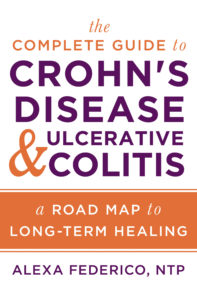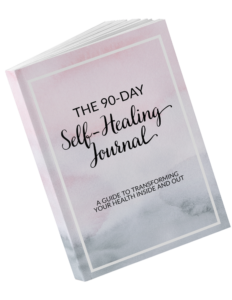The incredible need for vitamin D in the body is truly extraordinary, and the science shows that when dealing with autoimmune diseases including Crohn’s, it is especially crucial to have sufficient vitamin D levels.
What is Vitamin D?
Let’s get one thing straight; even though this nutrient is called “vitamin D,” it is actually a hormone that is responsible for regulating over 2,000 genes.
Vitamin D has an extensive list of jobs including:
- It is cancer protective and cancer fighting. Vitamin D inhibits: cancer cell growth, the metastasis (spreading) of cancer cells, and angiogenesis (red blood cells form to create and feed new cancer cells).
- It aids in weight control.
- Aids in optimal absorption of calcium.
- Aids in combatting hypertension.
- Lowers inflammatory markers.
And so much more! Here, I am digging into scientific studies on why staying on top of vitamin D levels is essential for Crohn’s disease support.

Vitamin D, Inflammation, & Crohn’s Disease
Besides its well-known link to bone health, vitamin D is now rightfully being recognized as an important immune-regulating substance. For those with an autoimmune disease such as Crohn’s disease or ulcerative colitis, this can be life-changing information.
People with active Crohn’s disease were found to have lower levels of vitamin D than people in remission (1). And those that were supplementing with vitamin D (even a very small dose at 400 IU daily in one study) had lower CRP (C-reactive protein, a measure of inflammation in the body) (1).
Why is this significant? Inflammation is one of the most prominent markers of disease activity. Untreated chronic inflammation can lead to narrowing and structuring (scarring) of the intestine, which may need to be removed by surgery. Inflammation can also manifest as physical Crohn’s symptoms, which can impair quality of life.
Another study that analyzed records from Crohn’s disease patients followed a similar correlation between vitamin D status and inflammation (2).
For geographical areas that see a change in seasons, especially summer with lots of sun and outdoor time and winter, with little outdoor time, inhabitants naturally make less vitamin D. People with Crohn’s who supplemented during the winter (November to April for the purposes of this study) had higher levels of vitamin D than non-users (1). However, supplementing from May-October did not have the same impact (1).
Since inflammation inhibits nutrient absorption, vitamin D is absorbed less effectively in people with Crohn’s disease, contributing to deficiency (2). Location of the disease, previous surgeries, and disease severity can also contribute to impaired nutrient absorption (2).
“In summary, vitamin D deficiency was an outcome of active inflammation in CD patients. Almost half of the CD patients were vitamin D deficient. On the other hand, more than 80% of patients with CD suffered from an intermediate to a high degree of inflammation” (2).
Does the Crohn’s disease develop first and vitamin D deficiency follows? Or does the deficiency contribute to the development of Crohn’s disease? Some studies suggest that vitamin D deficiency is linked to the development of Crohn’s, as in the works of Ham, et al. (2014) (2).
I personally believe that its a two-way scenario and vitamin D levels should be monitored to prevent illnesses from developing and should be maintained, especially in the presence of autoimmune disease.
How to Support Vitamin D Status Nutritionally
Vitamin D can be derived from food sources. Note: D3 can only be obtained through animal foods only. The top vitamin D-rich foods are fish and shellfish, grass-fed and pasture-raised meats and egg yolks, oysters, and grass-fed dairy.
These are wonderfully nutritious foods. To see how I eat to maintain my best health with Crohn’s, read How I Use Real Food to Manage an Autoimmune Disease.
How to Take Vitamin D for Crohn’s Disease
First, try to be outside as much as you can. We make vitamin D naturally through sun exposure (not covered with sunscreen). However, supplementing is often necessary.
It’s important to talk to your healthcare practitioner before deciding on a dose of vitamin D.
It has been shown that over six months, people with Crohn’s taking 400 IU/day did not see a significant increase in vitamin D status, however, people taking 2,000 IU/day, did (2).
Remember, quality matters! Look for fillers to avoid in the supplement and that you are taking vitamin D3 not vitamin D2. Vitamin D3 was shown to be significantly better absorbed than vitamin D2 (3). Vitamin D3 is an inactive form of vitamin D, so the body is able to store it and use it when needed. D2 on the other hand, needs to be converted to D3, and that process is not an easy one for the liver.
References
- Jørgensen, SP., Hvas, CL, Agnholt J, Christensen LA, Heickendorff L, Dahlerup JF. (2013). Active Crohn’s disease is associated with low vitamin D levels. Journal of Crohn’s & Colitis, 7(10), 407-13. doi: 10.1016/j.crohns.2013.01.012.
- Alrefai, D., Jones, J., El-Matary, W., Whiting, S. J., Aljebreen, A., Mirhosseini, N., & Vatanparast, H. (2017). The Association of Vitamin D Status with Disease Activity in a Cohort of Crohn’s Disease Patients in Canada. Nutrients, 9(10), 1112. http://doi.org/10.3390/nu9101112.
- Heaney, R.P., Recker, R.R., Grote, J., Horst, R.L., Armas, L.A. (2011). Vitamin D(3) is more potent than vitamin D(2) in humans. The Journal of Clinical Endocrinology & Metabolism, 96(3), 447-445. https://doi.org/10.1210/jc.2010-2230.
Remember, nothing stated in this article or the Girl in Healing website should be taken as medical advice. Everything written is solely for informational purposes and you should always consult your healthcare practitioner.






